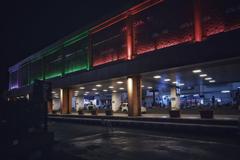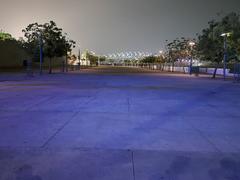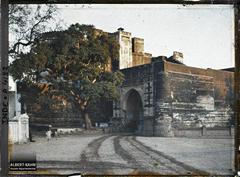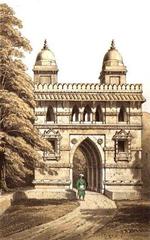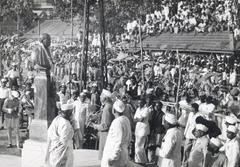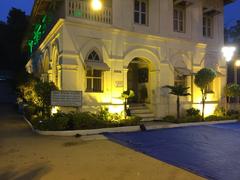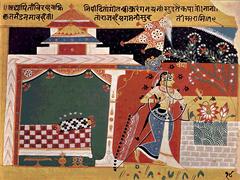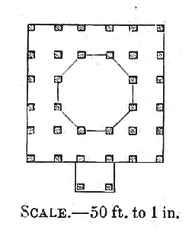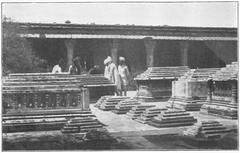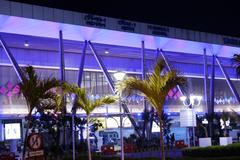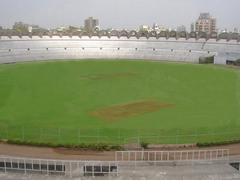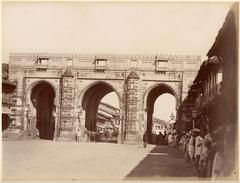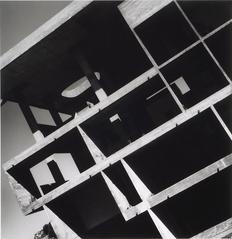Prem Darwaja Visiting Hours, Tickets, and Comprehensive Guide to Ahmedabad Historical Sites
Date: 03/07/2025
Introduction: Exploring the Legacy of Prem Darwaja in Ahmedabad
Prem Darwaja, also known as Premabhai Gate or the “Gate of Love,” is a monumental gateway standing on the northeastern edge of Ahmedabad’s old city. With origins tracing back to the 15th century under Sultan Ahmed Shah and later modifications during British colonial rule, Prem Darwaja is both an architectural marvel and a vibrant hub of urban life. Its Indo-Islamic design, historical significance, and enduring role in cultural festivities—most notably the Lord Jagannath Rath Yatra—make it an essential stop for heritage enthusiasts and travelers alike. This detailed guide will help you discover the rich history, architectural highlights, visiting hours, ticket information, accessibility tips, and local experiences surrounding Prem Darwaja, as well as connect you with other notable Ahmedabad historical sites.
Table of Contents
- Introduction and Significance
- Historical Origins and Construction
- Architecture and Conservation Status
- Cultural and Religious Importance
- Visitor Information: Hours, Tickets, Accessibility
- Nearby Attractions and Local Experiences
- Travel Tips and Visitor Insights
- Frequently Asked Questions (FAQ)
- Summary and Visitor Recommendations
- References
Historical Origins and Construction
Sultanate and Colonial Foundations
Prem Darwaja was originally constructed in the late 1400s as part of the fortified walls of Ahmedabad under Sultan Ahmed Shah. Its strategic location welcomed merchants and travelers entering the city from the northern and eastern routes, blending defensive, ceremonial, and commercial functions. The Indo-Islamic style is evident in its pointed arches, intricate stone carvings, and robust wooden doors with iron studs—features that have earned it conservation status from the Archaeological Survey of India (Friends of Ahmedabad-Heritage).
In 1864, the British colonial administration constructed an additional gate near the original to accommodate the expanding city and facilitate railway connectivity. Unlike the ornate Sultanate gates, the colonial-era gate emphasized functionality, with a wide arch and pragmatic design reflecting the shifting priorities of the time (Ahmedabad Heritage).
Architecture and Conservation Status
Prem Darwaja stands as a testament to Ahmedabad’s architectural evolution. The original structure, built from local stone, features a pointed arch flanked by bastions and retains rare, original wooden shutters. The British addition is more austere, constructed with brick and stone using lime mortar, optimized for increased traffic. Conservation efforts have intensified recently, with the ASI and local authorities introducing traffic bans, removing encroachments, and restoring original features to preserve the gate for future generations (The Live Ahmedabad).
Cultural and Religious Importance
Focal Point in Festivities
Prem Darwaja is central to Ahmedabad’s cultural fabric, especially during the annual Lord Jagannath Rath Yatra. The gate becomes a spiritual corridor as thousands of devotees pass through with the chariots of Lord Jagannath, Balabhadra, and Subhadra. The passage is considered highly auspicious, and the area transforms into a vibrant celebration with temporary markets and devotional performances (Curly Tales; Carknowlage).
Community and Harmony
Prem Darwaja sits at the intersection of diverse neighborhoods, fostering inter-community connections. During major events, residents of all backgrounds participate, offering hospitality and support to pilgrims and visitors. The site’s bustling marketplaces and nearby shrines further enrich its dynamic atmosphere.
Visitor Information: Hours, Tickets, and Accessibility
- Visiting Hours: Generally open 24 hours as part of public infrastructure. For best experience and safety, visit between 6:00 AM and 8:00 PM. During festivals, hours may be extended or adjusted.
- Entry Fee: Visiting Prem Darwaja is free—no ticket required.
- Accessibility: The site is pedestrian-friendly, with ramps at some points. However, narrow and uneven lanes may pose challenges for those with mobility issues, especially during crowded festivals.
- Guided Tours: Local tourism boards and private operators offer guided heritage walks that include Prem Darwaja. Advance booking is recommended, especially during festival seasons.
- Getting There: Easily accessible via city buses, auto-rickshaws, and rideshare services. Parking is limited; public transit or walking is advised (travellikeaboss.org).
Nearby Attractions and Local Experiences
- Lati Bazaar & Jordan Road: Bustling markets for textiles, handlooms, dry fruits, and local snacks (heritage.ahmedabadcity.gov.in).
- Teen Darwaja & Lal Darwaja: Other historic gates featuring Sultanate-era architecture.
- Sabarmati Riverfront & Manek Chowk: Popular for evening strolls and street food.
- Sabarmati Ashram: Mahatma Gandhi’s historic residence, a short ride away.
- Ambica Tea Company, Shri Agarwal Handloom, Pradeep Confectionery: Local favorites for authentic flavors and shopping (yappe.in).
Travel Tips and Visitor Insights
- Best Time to Visit: Early mornings or late afternoons, especially to avoid midday heat and crowds.
- Safety: Ahmedabad is generally safe; stay vigilant in crowded areas and keep valuables secure.
- Health & Hygiene: Carry water, hand sanitizer, and basic medications. Choose hygienic food vendors.
- Cultural Etiquette: Dress modestly and respect local customs. Always seek permission before photographing individuals.
- Photography: Early morning light is ideal for capturing the gate and market scenes.
Frequently Asked Questions (FAQ)
Q: What are Prem Darwaja’s visiting hours?
A: Open 24/7 as public infrastructure, though daylight hours (6:00 AM–8:00 PM) are best for visitors.
Q: Is there an entry fee or ticket required?
A: No, visiting Prem Darwaja is free.
Q: Are guided tours available?
A: Yes, local guides and heritage walks often include Prem Darwaja.
Q: How accessible is Prem Darwaja for people with disabilities?
A: The area is pedestrian-friendly but has narrow, uneven lanes; assistance is recommended.
Q: Which other heritage sites are nearby?
A: Teen Darwaja, Sabarmati Riverfront, Manek Chowk, and Sabarmati Ashram are all accessible from Prem Darwaja.
Summary and Visitor Recommendations
Prem Darwaja stands as a powerful symbol of Ahmedabad’s layered history, bridging ancient Sultanate grandeur and British colonial pragmatism. Its continued role as a community hub—whether as a market gateway, spiritual landmark, or festival focal point—reflects the city’s dynamic spirit. Thanks to ongoing conservation efforts, Prem Darwaja remains accessible and relevant, inviting locals and travelers to explore its stories.
For an immersive visit:
- Arrive during daylight or festival mornings for the most vibrant atmosphere.
- Explore adjacent markets for authentic shopping and street food.
- Consider guided heritage walks for deeper insights.
- Plan to visit nearby sites such as Teen Darwaja and Sabarmati Riverfront.
Stay connected and informed by using the Audiala app and checking official tourism channels for updates, events, and guided tour options.
References
- Friends of Ahmedabad-Heritage
- Ahmedabad Heritage
- Curly Tales
- heritageofahmedabad.com
- The Live Ahmedabad
- Carknowlage
- travellikeaboss.org
- yappe.in
- hikersbay.com
- listif.com
- english.bombaysamachar.com
- gujaratdarshanguide.com
